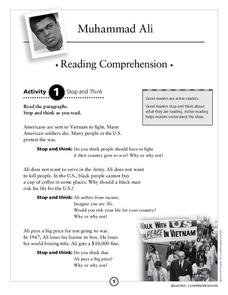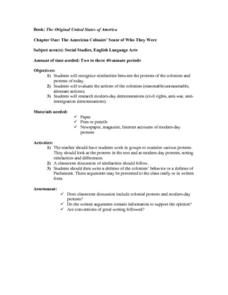Library of Congress
Muhammad Ali
Muhammad Ali was the greatest, as he'd tell you himself. A set of reading comprehension worksheets walks through parts of Ali's life and promotes individuals to become good readers and writers.
Constitutional Rights Foundation
Options for Affecting Public Policy
Letter-writing, e-mail and telephone campaigns, petitions, marches, meetings, with lawmakers. Options for influencing elected representatives are the focus of resource that details how to craft each of these approaches to influencing...
University of California
The Vietnam War (1945 – 1975)
Have you ever wanted to do something so perfectly you wound up not doing it well at all? Young historians use primary and secondary documents to analyze the United States involvement in the Vietnam War. The issues surrounding the...
State Bar of Texas
Dred Scott v. Sandford
Who decides someone is not a real person? Scholars investigate the Dred Scott v. Sandford court case which deals directly with slavery and citizenship. After viewing a short video clip, classmates work in pairs to assess and discuss the...
Judicial Learning Center
Your 1st Amendment Rights
Why should classes care about the First Amendment? An engaging lesson serves as a powerful tool for answering just that. As all four cases in the lesson relate directly to freedom of expression in schools, young scholars explore the...
Judicial Learning Center
The Constitution and Rights
What's the right way to teach young historians about the Bill of Rights? Many an instructor has asked this question when pondering lesson plans over the US Constitution. The Constitution and Rights is a nifty resource that provides a...
Curated OER
Selfless Service and The Giving Tree - Building Ethical Conscience
Upper elementary schoolers investigate philanthropy and selflessness by reading a children's book. In this ethics lesson, they read The Giving Tree by Shel Silverstein, and research Mahatma Gandhi's troublesome, yet inspiring, life....
Curated OER
Book: The Original United States of America
Learners, after reading Chapter One in the book, "The American Colonies' Sense of Who They Were," analyze the actions of the colonists as well as compare the similarities between the protests of the colonists and protests of today. They...
Curated OER
Civil Disobedience Action Plan
Students investigate incidences of civil disobedience. For this civil disobedience lesson, students watch a video and read a newspaper article on civil disobedience. Then, in groups, they search a current newspaper for examples of civil...
Curated OER
Martin Luther
In this Martin Luther study guide worksheet, students read a brief overview pertaining to the man and then respond to a reflection question.
Curated OER
Journey to Synergy on the path of Gandhi and King
Students explore the concept of synergy. In this peace and tolerance lesson, students read sections of The 7 Habits of Highly Effective Teens by Covey and then discuss how Gandhi and King mastered the art of synergy. Students then...
Curated OER
Everyday Courage
Sixth graders compare scenarios about courage. In this character education lesson, 6th graders discover what it means to be brave. Students analyze scenarios and determine if courage was necessary.
Curated OER
Voicing Your Opinion
Ninth graders study the time period of Martin Luther. In this World History instructional activity, 9th graders create their own 95 Theses. Students compare their 95 Theses to that of Martin Luther.
Curated OER
The Power of Our Stories
Students compare violence to nonviolence. in this peace instructional activity, students tell stories from their own life that show the difference between violence and nonviolence. They listen to examples of Gandhi and Martin Luther King.
Curated OER
Gandhi's Salt March, A Simulation
Students examine Gandhi's Salt March. In this peace and tolerance lesson, students discuss the Salt Tax Levy that was imposed in India. Students then debate how the Indian National Congress should have handled the issue.
Curated OER
Gandhi Speaks Through Clothing
Learners analyze how Gandhi used the way he dressed to communicate with the Indian people. Students understand why Mahatma Gandhi was such an effective leader of the Indian struggle for independence from British colonial rule
Curated OER
Thoreau, Gandhi, and Martin Luther King, Jr.
Students explore the concept of non-violent resistance. In this political philosophies lesson, students study the political tactics of Mohandas Gandhi, Henry David Thoreau, and Martin Luther King, Jr. in order to discover how each of...
Curated OER
The Outrage of Ordinary Men: Pennsylvania's Role in the Great Railroad Strike of 1877
Learners study the events that surround the Great Railroad Strike of 1877. In this historical lesson students work in groups to analyze documents, determine the facts and present a summary of their findings to the class.
Curated OER
The Art of Nonviolence: Martin Luther King, Jr., Gandhi, and Concepts of Nonviolence in Indian Art
Learners make connections between nonviolent ideals and art. In this visual arts lesson, students discuss the successes of the American Civil Rights Movement and discuss Gandhi's influence on the movement. Learners then examine images of...
Curated OER
What do they want? Critical Perspectives on the 1960's in the United States
Students determine that history is a field of study that can help them understand themselves and the people around them. By reading sources by and about people with many of the same interests and concerns that they have and learning to...
Curated OER
Satyagraha, Its Origins and Applications
Tenth graders study the steps and methods taken by Gandhi. In this World History lesson, 10th graders create illustrations to represent these steps. Students write a persuasive essay on these measures taken by Gandhi.
Curated OER
Satyagraha in Daily Life
Eighth graders explore the concept of satyagraha. For this Mohandas Gandhi lesson, 8th graders read a story titled, "Satyagraha," and discuss the application of the Gandhi's method in the world today.
Curated OER
Classroom Management Using Gandhian and Kingian Principles of Nonviolence
Tenth graders study the concept of civil disobedience. In this Current Events lesson, 10th graders participate in a survey that nominates students for hard work and exemplifies nonviolence.
Curated OER
Another Perspective on Modern Civilization
Students consider the impact of current issues on the world population. For this global studies lesson, students discuss the pros and cons of modernization after they listen to a lecture about Gandhi's opinion of modern civilization....

























